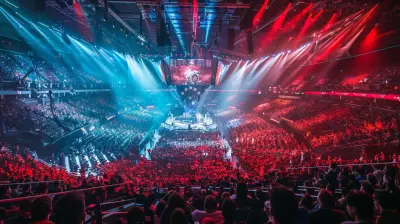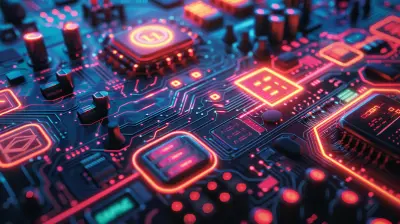How Game Engines Define System Requirements
11 December 2024
You’ve probably been there before—you’re hyped about a new game, only to realize your PC isn’t up to the task. Frustrating, right? That’s when you find yourself Googling things like “Can my PC run this game?” or “What do system requirements even mean?” Well, let’s break it down. Ever wondered how game developers decide what hardware you need to play their games? The secret lies in the heart of the game: the game engine.
Game engines are the unsung heroes of the gaming world. They’re the backbone that makes everything tick. And when it comes to defining a game’s system requirements, they’re the number one culprit (in a good way). Let’s dive into how game engines dictate those specs that determine if your computer feels like a Formula 1 race car or a horse-drawn wagon.
What is a Game Engine, Anyway?
Before getting into the nitty-gritty of system requirements, let’s make sure we’re on the same page about game engines. Think of a game engine as a kitchen in a restaurant. It’s where all the ingredients (graphics, physics, sound, AI, etc.) come together to create the final dish—the game.A game engine provides the tools developers need to build the game world. This includes rendering visuals, managing physics, animating characters, handling audio, and even networking in multiplayer games. Popular engines like Unreal Engine, Unity, CryEngine, and others have become household names in the development community.
Each engine has its own features, pros, cons, and—here’s the kicker—hardware demands. Whether a game runs smoothly or stutters like an old cassette player often comes down to how complex that engine is.
The Role of Game Engines in Setting System Requirements
1. Graphics and Visual Fidelity
Graphics are probably the first thing that comes to mind when you hear “system requirements.” Modern game engines like Unreal Engine 5 and Unity boast cutting-edge rendering technologies. Features like ray tracing, high-definition textures, and volumetric lighting make games look mind-blowing—but they also demand beefy GPUs (graphics processing units).Want breathtakingly realistic visuals? You’ll need a system that can handle all those polygons and pixels. Game engines define how these visuals are rendered, and that directly affects the minimum and recommended specs for a game.
For instance, if a game is built on Unreal Engine 5 and uses advanced features like Lumen for lighting or Nanite for detailed environments, it’s going to push hardware to its limits. On the flip side, simpler engines like Godot (often used for indie games) are much less demanding because they focus on performance and accessibility over cutting-edge graphics.
2. Physics and Interactions
Now, let’s talk about physics. The way objects interact in the game world—like how a car crumples in a crash or how water ripples when a character walks through it—comes down to the physics engine. Engines with advanced physics simulations, like Havok or PhysX, require your CPU (central processing unit) to do a lot of heavy lifting.If your PC doesn’t have enough horsepower, you’ll likely see stuttering or outright crashes when physics-heavy scenes play out. Games like Red Dead Redemption 2 or Cyberpunk 2077 are a testament to how demanding advanced physics can be.
3. AI and NPC Behavior
Ever noticed how NPCs (non-playable characters) in some games feel smarter than in others? That’s AI (artificial intelligence) at work. Game engines that support complex AI, such as Unreal and CryEngine, require CPUs to handle tasks like pathfinding, decision-making, and simulating realistic behavior.The more sophisticated the AI systems, the higher the load on your CPU. For instance, open-world games where NPCs live their own lives in a dynamic environment (think Elden Ring or The Witcher 3) will need a robust CPU to handle all that brainpower.
4. Audio Processing
Game audio often flies under the radar, but it’s another sneaky factor that game engines control. Spatial audio, ambient soundscapes, and even voice modulation require your system to process audio in real time. Advanced audio engines like Wwise or FMOD can add an extra layer of realism, but they can also increase system requirements, especially if you’re using onboard audio rather than a dedicated sound card.5. Optimization and Scalability
Here’s the thing—some game engines are better at optimization than others. Optimization is the art of making a game run smoothly across various hardware setups. Unity and Unreal, for instance, offer tools for developers to scale a game’s performance from low-end PCs to high-end rigs. However, it’s up to the developers to use those tools effectively.If a game feels like it was slapped together without considering optimization, even high-spec PCs can struggle to run it. On the other hand, well-optimized games often come with a range of graphical settings so you can tweak the experience to match your hardware.
Minimum vs. Recommended Requirements: What’s the Difference?
When you look at the system requirements for a game, you’ll typically see two sets of specs: minimum and recommended. But what do these actually mean?- Minimum Requirements: These are the bare minimum specs you need just to launch the game. It doesn’t guarantee a smooth experience. Think of it as being able to limp to the finish line of a marathon—you’re in the race, but it’s not pretty.
- Recommended Requirements: These are the specs needed to enjoy the game as the developers intended. It’s all about playing at higher settings, with smoother frame rates and fewer compromises.
Game engines play a pivotal role in determining these thresholds. For instance, if a game is built on a demanding engine like Unreal Engine with all the bells and whistles, the recommended specs are going to be pretty steep. Meanwhile, games built on simpler engines may have much lower requirements.
Why System Requirements Are Always Changing
Ever notice how games from just a few years ago ran fine on your PC, but newer ones make it feel ancient? Blame progress. As game engines advance, they incorporate new technologies that push hardware to its limits.For example:
- Ray Tracing: A fancy lighting technique that makes reflections and shadows look hyper-realistic. It’s now a big selling point for GPUs, but it also skyrockets system requirements.
- Higher Textures & Resolutions: While 1080p gaming was once the gold standard, we’re now moving into 4K (and even 8K!) territory. That requires a lot more VRAM.
- VR and AR Games: Virtual reality (VR) and augmented reality (AR) are becoming more mainstream. These experiences rely heavily on powerful hardware and specialized engines like Unity XR.
In short, system requirements are evolving because game engines are evolving. And while that’s great news for jaw-dropping games, it can be tough on our wallets.
How You Can Avoid Getting Left Behind
Not everyone can afford to upgrade their PC every time a new game comes out. So, what can you do to stay in the game, figuratively and literally? Here are a few tips:1. Check the Settings Menu
Many modern games let you customize your settings extensively. Lowering things like texture quality, shadow resolution, or disabling advanced features like ray tracing can make a world of difference.2. Update Your Drivers
Don’t skip those GPU and CPU updates. They often include optimizations for the latest games.3. Use Benchmarking Tools
Tools like 3DMark or MSI Afterburner can help you figure out what’s slowing your system down. Knowledge is power, right?4. Upgrade Strategically
If you’re thinking about upgrading, focus on your GPU and CPU first. These are usually the bottlenecks when running modern games. RAM and SSD upgrades also help but are secondary.Final Thoughts: It’s All About Balance
Game engines are the wizard behind the curtain when it comes to system requirements. From graphics and physics to AI and audio, they define what kind of hardware you’ll need to run your favorite games. Sure, it can be frustrating when your rig doesn’t meet the specs, but that’s the price of progress. The good news? Game engines are also becoming better at optimizing performance, so there’s hope for us budget gamers out there.At the end of the day, gaming is all about finding the right balance between performance and visuals. And remember—just because your system struggles with a game today doesn’t mean it’s game over. There are always tweaks, upgrades, and indie titles out there to keep the fun alive.
all images in this post were generated using AI tools
Category:
System RequirementsAuthor:

Brianna Reyes
Discussion
rate this article
14 comments
Gabriel McHugh
Game engines dictate performance—embrace the truth: upgrading isn’t optional if you want to experience gaming at its best!
February 7, 2025 at 4:35 AM

Brianna Reyes
While game engines do influence performance, it's essential to balance upgrades with your budget and preferences. Upgrading can enhance gaming experiences, but it's not the only path to enjoyment.
Kennedy McMeekin
Game engines are the beating heart of gaming! Understanding their impact on system requirements is key for developers and players alike. Embrace the technology, push the limits, and elevate your gaming experience to new heights!
February 2, 2025 at 5:46 AM

Brianna Reyes
Absolutely! Game engines are crucial in shaping system requirements and enhancing the gaming experience. Embracing this technology allows both developers and players to maximize performance and innovation.
Isaiah Valentine
This article offers valuable insights into how game engines impact system requirements. Understanding this connection is essential for both developers and players. Thank you for shedding light on this important aspect of gaming technology!
January 28, 2025 at 4:14 PM

Brianna Reyes
Thank you for your thoughtful comment! I'm glad you found the insights valuable for both developers and players.
Arwenia McMaster
Thank you for shedding light on this important topic! Understanding how game engines influence system requirements is vital for gamers and developers alike. Your insights will help many make informed decisions about their setups, ensuring a smoother gaming experience for all. Keep up the great work!
January 23, 2025 at 5:13 PM

Brianna Reyes
Thank you for your kind words! I'm glad you found the insights helpful. Understanding system requirements is crucial for optimizing both gaming and development experiences.
Rachael Hudson
Ah, game engines and their system requirements—like trying to fit a hippo into a smart car! One minute you’re gaming on a potato, and the next, it’s demanding a tech upgrade worthy of launching a spaceship. Can’t I just play Solitaire instead?
January 21, 2025 at 3:58 PM

Brianna Reyes
Haha, I know the struggle! Game engines can indeed be demanding, but they push for better experiences. Solitaire might be the perfect low-key alternative!
Fleur Warner
This article provides valuable insights into how game engines influence system requirements. Understanding this relationship is essential for both developers and players, ensuring optimal performance and compatibility. Thank you for shedding light on this important topic!
January 18, 2025 at 5:58 AM

Brianna Reyes
Thank you for your thoughtful comment! I'm glad you found the insights valuable. Understanding this relationship is indeed crucial for enhancing both development and gameplay experiences.
Amelia Wilson
Great insights! Understanding how game engines influence system requirements really helps clarify the tech behind our favorite games. It’s fascinating to see the interplay of design and performance!
January 12, 2025 at 6:05 AM

Brianna Reyes
Thank you! I'm glad you found the insights helpful. The relationship between game engines and system requirements is indeed a crucial aspect of game development.
Garrett Kline
Insightful read! Understanding game engines' impact on system requirements is crucial for gamers and developers alike.
January 6, 2025 at 4:44 PM

Brianna Reyes
Thank you! I'm glad you found it insightful. Understanding these factors is essential for making informed choices in gaming and development.
Zachary McNair
Understanding how game engines shape system requirements is crucial for both developers and players in optimizing performance.
January 4, 2025 at 3:37 PM

Brianna Reyes
Thank you for your insight! Understanding game engines is indeed vital for optimizing performance for both developers and players.
Reid Meyers
This article provides valuable insight into how game engines shape system requirements, emphasizing their impact on performance and user experience. Understanding these factors is essential for developers and gamers alike, as it helps guide hardware choices and informs future gaming innovations. Great read!
December 28, 2024 at 5:51 PM

Brianna Reyes
Thank you for your thoughtful comment! I'm glad you found the article insightful and valuable for both developers and gamers. Your feedback is much appreciated!
Nathan Hodge
Great article! Understanding how game engines impact system requirements really helps gamers make informed hardware choices for optimal performance.
December 22, 2024 at 5:54 AM

Brianna Reyes
Thank you! I'm glad you found the article helpful in making informed hardware decisions for gaming.
Isaac McDonough
This article beautifully highlights the crucial role of game engines in shaping system requirements. Understanding these nuances can greatly enhance our gaming experiences. Thank you for shedding light on this topic; it’s a reminder of the incredible effort behind the games we love.
December 15, 2024 at 4:35 AM

Brianna Reyes
Thank you for your thoughtful comment! I'm glad you found the article insightful—game engines truly are vital in shaping our gaming experiences.
Bernadette McVicar
Game engines are like culinary wizards—each one has a unique recipe for virtual fun! A dash of graphics here, a sprinkle of processing power there, and voila, gaming magic happens!
December 12, 2024 at 5:29 PM

Brianna Reyes
Absolutely! Just like chefs tailor recipes, game engines optimize system requirements to create unique gaming experiences, balancing graphics and performance for each title.
Kaitlin Warren
Great read! It’s fascinating how game engines shape system requirements, influencing everything from player experience to hardware choices. Understanding this can really enhance our gaming setup decisions.
December 11, 2024 at 6:03 AM

Brianna Reyes
Thank you! I'm glad you found it insightful. Game engines truly play a pivotal role in optimizing both player experience and hardware selection.
MORE POSTS

Puzzle Mobile Games that Challenge Your Mind and Patience

The Role of Media in Shaping Esports Team Reputations

The Legacy of Point-and-Click Adventures Like Monkey Island

How Strategy Games Built a Foundation for Esports

How to Master Controls in Fast-Paced Mobile Shooters

Wireless Gaming Gear Debunked: Are Latency and Battery Life Still Issues?

Loot or Fight: When to Engage in Battle Royale Matches

The Art of Creating Memorable User Interfaces in Video Games

Exploring the Psychological Depths of Gaming Villains